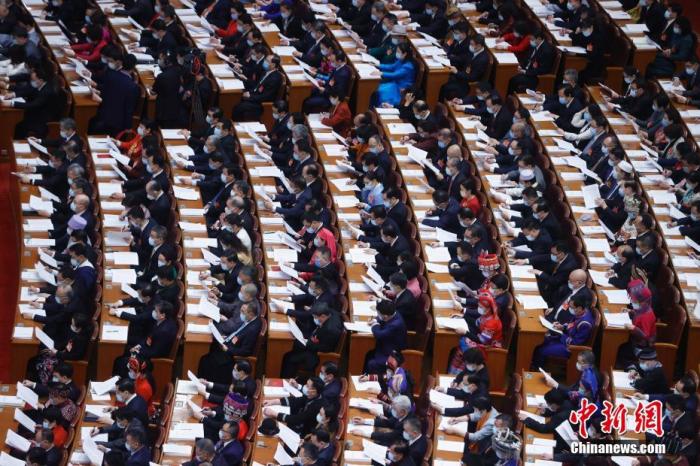China News Service, Beijing, March 6th, Wire Title: China Amends Laws to Promote "Full Process Democracy"
China News Agency reporter Liang Xiaohui
The People's Congress system is China's fundamental political system, and it is also a concentrated expression of China's democratic politics.
In ensuring its effective operation, two basic laws play an important role-the National People's Congress Organic Law and the National People's Congress Rules of Procedure.
Right now, the National People's Congress is passing the first amendments to these two laws to promote "full-process democracy" and make China's democratic politics more lively and full of vitality.
Data map: On March 5, the Fourth Session of the Thirteenth National People's Congress opened in the Great Hall of the People in Beijing.
Photo by China News Agency reporter Du Yang
——The concept is more substantial.
"People's democracy is a kind of democracy in the whole process", China's top leader Xi Jinping once put forward this argument.
This revision of the two laws reflects this concept.
Compared with the current NPC Organic Law, the revised draft adds a provision: The National People’s Congress and its Standing Committee adhere to the whole process of democracy, maintain close contact with the people, listen to their opinions and suggestions, and always insist on embodying the people’s will and protecting the rights and interests of the people.
At the same time, in the request to the NPC deputies, the draft adds the expression "to give full play to the role of democracy in the whole process."
In fact, these have been reflected in the practice of the National People's Congress and its Standing Committee, the most notable being the contact points of grassroots legislation.
Statistics show that in 2020, the Legislative Work Committee of the Standing Committee of the National People's Congress will solicit opinions from 10 grassroots legislative contact points across the country for 16 draft laws, and received more than 1,300 opinions and suggestions, many of which were adopted.
"Everyone's affairs are discussed by everyone" "to find the greatest common divisor of the will and requirements of the whole society", this is the embodiment of China's "full-process democracy".
Data map: On March 5, the Fourth Session of the Thirteenth National People's Congress opened in the Great Hall of the People in Beijing.
The picture shows the representative listening attentively.
Photo by China News Agency reporter Du Yang
-The mechanism is more complete.
The amendments to the two laws intend to absorb and solidify the beneficial practices explored in the practice of the people's congress system over the past 30 years.
For example, the revision of the rules of procedure of the National People's Congress has further expanded the publicity of the meeting and added regulations: the plenary meeting of the General Assembly can be publicly reported through radio, television, and the Internet.
There are people or questions, isn't this commonplace?
But as early as 1989, when this law was enacted, China had not yet entered the "Internet age". These "usualities" were the beneficial explorations of the National People's Congress before the law, including today's common webcasts, press conferences, and "ministers". Channel" and so on.
Similarly, the draft amendment to the Organic Law of the National People's Congress, in accordance with the current legislative practice, sets up a chapter of "General Provisions", which further reflects the characteristics of the era of legislation.
The law reflects social changes.
This revision of the law shows that following the development of the times, China's democratic system has been continuously improved.
——The program is more efficient.
Last year, under the special background of the prevention and control of the new crown pneumonia epidemic, the National People's Congress appropriately shortened the duration of the meeting, becoming the shortest meeting since the reform and opening up, but "the elements are not reduced, pragmatic and efficient."
Summarizing this experience, the draft amendments to the rules of procedure of the National People's Congress set out principles for the organization of "condensed" meetings, clarifying that the meeting schedule should be arranged in a reasonable manner to improve the quality and efficiency of deliberations.
In addition, on the premise of ensuring the quality of deliberation of legal bills, the number of deliberation links has been reduced and the meeting procedures have been simplified.
At the same time, strict meeting disciplines and a clear leave system for representatives, etc.
These modifications are considered more suitable for reality.
"It complies with the relevant provisions of the Legislative Law, and will not affect the quality of deliberation of legal bills." Tong Weidong, director of the National Law Office of the Legal Work Committee of the Standing Committee of the National People's Congress, believes that although the procedures have been streamlined and the duration of the meeting has been reduced, it is more important for high-quality meetings. Guaranteed.
(Finish)

